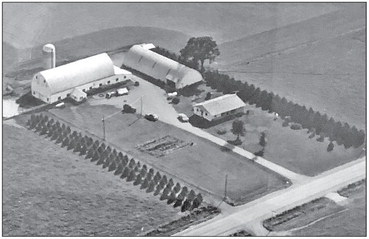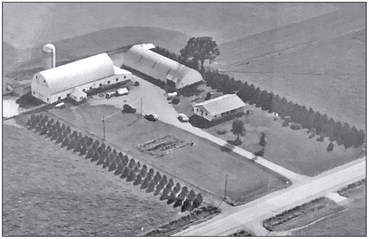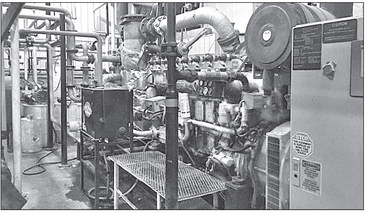BACH F


ARMS
Longtime family operation adapts for the 21st century
Dairy farming is an ever-changing industry, with the current advances in technology and innovation on the forefront of how farms manage their dairies to succeed and to be sustainable.
Bach Farms of Dorchester is embracing the technology and constantly looking for ways to improve and reduce their impact on the environment. Over the last 10 years the farm has made many changes to become the diversified business that it is. The owners are dedicated to being a good neighbor and living the concept of sustainable growth.
Bach Farms LLC was started by Irvin and Marlene Bach in 1956 and has continued to evolve into what it is today with the passion and dedication of their son, Steven, and his wife, Linda Bach, taking over in 1983.
Bach Farms is now a multifaceted company that consists of a dairy division, beef division and cropping division. Managing four, 80 Holstein cow dairies, Steven and Linda continued to increase cow numbers throughout the 1980s.
Operations were consolidated in 1996 with the building of the first freestall barn and milking parlor at the main farm. Over the next 20 years the farm continued to grow and become what it is today.
At the beginning of the last decade the decision was made to expand the herd, with milk prices looking optimistic and the ability to raise quality replacement heifers of their own. Ten years ago, Bach was milking approximately 900 cows; today, that number is closer to 1,700. The parlor was expanded in 2013, to allow more cows to be milked, and the first freestall built in 1996 was expanded and updated to the new standards of cow comfort. In 2015, a special needs, or hospital area, and maternity area was added to the second freestall barn, which includes a special parlor for milking treated cows or slow milking cows for milk to be fed to their baby calves.
“The introduction of calf barns started in 2015 with the building of the first of four barns to house our baby calves in, instead of the traditional form of housing in a calf hutch. We’ve been very happy with the improvement in calf health overall and our employees are happier to be feeding and caring for animals indoors in the winter,” said Cathy Bach, dairy manager. “The calves are separated into individual pens at first and gradually grouped together by removing panels. This allows them to get used to being in a group better.”
Cathy took over the dairy manager responsibilities in late 2018. She said the focus of the dairy has been on cow comfort as well as employee comfort.
“If our employees aren’t comfortable it makes it difficult to do a good job for our animals” Cathy said.
At the end of 2017, Bach Farms built the latest of three freestall barns. This barn incorporates the latest ideas in cow comfort and technology. With engineers helping to create the best environment for the cows, this barn holds the highest producing cows of their herd.
Technology has played a large role in herd management on the dairy. The installation of a feed management software program allows for computerized feeding schedules and diets for all the animals.
A new herd management software, Bovisync, installed in 2018 allows all dairy employees to access cow information from an app on their phones. This allows them to have real time data when making decisions on how to handle any animal on the farm.
The biggest step toward driving sustainability at Bach Farms was the installation of an anaerobic digester at the end of 2009, and then a second digester and generator in 2014.
An anaerobic digester converts methane gas from manure into renewable electricity that is used throughout Bach Farms and neighboring areas. To do this, methane gas powers two 300 kwh generators that produce enough electricity to power approximately 400 homes.
The digester also allows the Bachs to reclaim the solids through a screw press separator to reuse as bedding for the barns for cows. The liquid that is separated from the solids is then transferred to a holding lagoon to be used as fertilizer. This liquid, which is then spread on fields in the spring and fall, has a very low odor due to the methane being removed from the manure, making manure spreading a little less smelly for any neighbor living nearby.
The future for the digester looks a little different as changes in technology have come along in the last 10 years. The next 10 years holds a change of hopefully cleaning the methane gas and allowing it to enter the natural gas pipeline.
“We are currently working with a company to make this conversion happen in the next year.” said Cathy Bach.
The cropping division of Bach Farms has seen changes over the years as well with the technology of precision farming coming into the picture.
This technology allows for the use of GPS in the planting and harvesting of the approximately 7,500 acres farmed by the Bachs. By using GPS to accurately map the field a farm is able to more accurately apply seed and fertilizer.
The rate of the seed application is controlled in the planter by a computer as well as the rate the fertilizer that is applied to each part of the field. This data is collected in the tractor and is then analyzed to make decisions for future years.
“Autosteer in our tractors has been a huge game changer as well,” says Chad Bach. “Our rows are straight and there is no doubling up of seed on odd shaped fields with the auto shutoffs available now on our planters.”
Chad handles the cropping division of the farm sharing the seed selection and fertilizer duties with Steven.
The dedication of Steven and Linda is continuing in the next 10 years with the next generation taking a leading role on the farm in the form of Steven’s oldest son, Chad, and his wife, Cathy.


